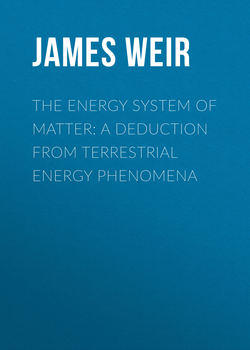Читать книгу The Energy System of Matter: A Deduction from Terrestrial Energy Phenomena - James Weir - Страница 5
PART I
GENERAL STATEMENT
3. Advent of Energy—Distortional Effects
ОглавлениеNature, however, does not furnish us with any celestial or other body fulfilling such conditions. Absolutely linear motion is unknown, and matter is never found divorced from energy. To complete the system, therefore, the latter factor is required, and, with the advent of energy to the mass, its prototype may be found in the natural world.
This energy is assumed to be communicated in that form which we shall term "work" energy (§§ 13, 31) and which, as a form of energy, will be fully dealt with later. This "work" energy is assumed to be manifested, in the first place, as energy of motion. As already pointed out, no expenditure of energy can be associated with a linear motion of the mass, since that motion is under no restraint, but in virtue of the initial central attraction or gravitative strain, the form of energy first communicated may be that of kinetic energy of rotation. Its transmission to the mass will cause the latter to revolve about some axis of symmetry within itself. Each particle of the mass thus pursues a circular path with reference to that axis, and has a velocity directly proportional to its radial displacement from it.
This energised rotating spherical mass is thus the primal conception of the energy scheme now to be outlined. It will be readily seen that, as a primal conception, it is essentially and entirely natural; so much so, indeed, that any one familiar with rotatory motion might readily predict from ordinary experience the resulting phenomena on which the scheme is, more or less, based.
When energy is applied to the mass, the first phenomenon of note will be that, as the mass rotates, it departs from its originally spherical shape. By the action of what is usually termed centrifugal force, the rotating body will be distorted; it will be flattened at the polar or regions of lowest velocity situated at the extremities of the axis of rotation, and it will be correspondingly distended at the equatorial or regions of highest velocity. The spherical body will, in fact, assume a more or less discoidal form according to the amount of energy applied to it; there will be a redistribution of the original spherical matter; certain portions of the mass will be forced into new positions more remote from the central axis of rotation.
